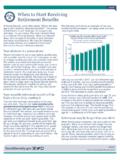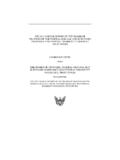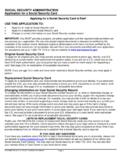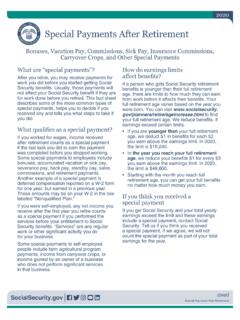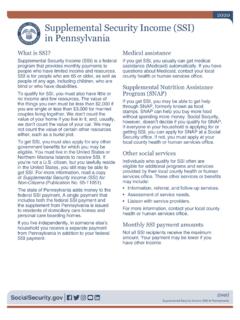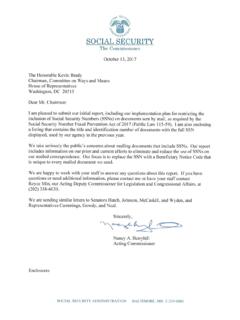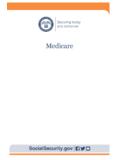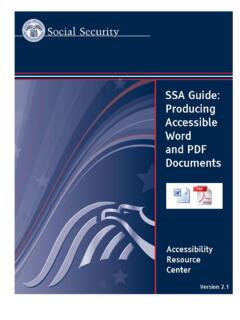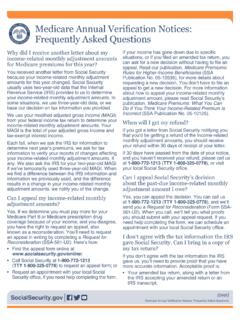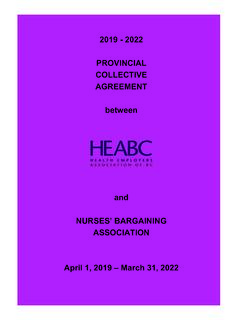Transcription of Temporary Disability Insurance
1 Monthly cash benefits to coal miners who are totally disabled by pneumoconiosis (black lung) contracted as a result of employment in and around the Nation s coal mines. benefits are payable to a worker s dependents or to the survivors of a worker who has died as a result of this disease. A coal miner is considered to be totally disabled if unable to engage in comparable and gainful work by reason of pneumoconiosis that has lasted or can be expected to last for 12 months or to result in death. The Social Security Administration (SSA) generally exercises jurisdiction over all black lung claims filed by miners from enact-ment of the law through June 1973 and, therefore, pays monthly benefits to a declining number of people. The Department of Labor (DOL) has primary responsibility for all claims filed after June 1973. Although the DOL makes the Disability determinations, the SSA field offices accept black lung applications for the DOL on a reim-bursable basis.
2 Black Lung (Part B) Program Data, 1996 The total number of beneficiaries: 131,100. The beneficiaries included 21,500 miners, 85,600 widows, and 24,100 dependents. Total annual payments: $ million. Average monthly benefits for miners were $ , and $ for widows. 96% of miners and widows were over 64 years old. 72% of all beneficiaries resided in five States: Pennsylvania, West Virginia, Kentucky, Virginia, and Ohio. TemporaryDisability Insurance Temporary Disability Insurance , sometimes referred to as cash sickness benefits , provides workers with partial compensation for loss of wages caused by Temporary nonoccupational Disability . Only five States, Puerto Rico, and the railroad industry have Temporary Disability Insurance laws. It was during the severe depression of the thirties that the United States began its national social Insurance programs of unemployment Insurance and old-age Insurance .
3 Consequently, providing protection against costs of sickness that are more or less recurring regardless of economic conditions did not seem to have the same urgency as providing protection against cyclical unem-ployment and old-age dependency. The Federal law provided no basis for a system of compensation for wage loss due to short-term sickness or Disability that was comparable to the Federal-State system of unemployment Insurance . The first State Temporary Disability Insurance or cash sickness Insurance law was enacted by Rhode Island in 1942, followed by legislation in California in 1946, New Jersey in 1948, and New York 44 SOCIAL Insurance PROGRAMSin 1949. Then came a hiatus of two decades before Puerto Rico and Hawaii passed laws in 1968 and 1969, respectively. The Railroad Unemployment Insurance Act of 1938 established a system of benefits for persons employed in the railroad industry.
4 The Act was amended in 1946 to include sickness benefits . (This federally operated program is described in the section on programs for railroad workers.) Coverage The Temporary Disability Insurance laws, like the unemployment Insurance programs, cover most commercial and industrial wage and salary workers in private employment. Principal occupational groups excluded are domestic workers, family workers, government employees, and the self-employed (except California law permits elective coverage for self-employed persons). State and local government employees are included in Hawaii, and the other State laws permit some or all public employees to elect coverage. Only California, Hawaii, New Jersey, and Puerto Rico cover agricultural workers. In Rhode Island and the railroad industry, all benefits are provided from publicly operated Disability Insurance funds. In California, New Jersey, and Puerto Rico, employers may contact out of the public plan by providing an approved private plan, usually one insured by a commercial company or financed on a self-insured basis.
5 The laws in Hawaii and New York require em-ployers to provide sickness protection of a specified value for their employees by establishing a privately insured or self-insured plan, or in the case of New York, by insuring with a State fund that itself has many characteristics of a private carrier. In jurisdictions that allow private plans, union or union-management plans may provide the sickness benefits required by law. Eligibility for benefits To qualify for benefits , a claimant must have a specified amount of past employment or earnings and be disabled. The laws gener-ally define Disability as the inability to perform regular or customary work because of a physical or mental condition. In most jurisdictions with private plans, workers become imme-diately insured upon their employment or, in some cases, some probationary period of employment is required, usually from 1 to 3 months.
6 Upon cessation of employment after a specified period, workers generally lose their private plan coverage and must look to the State fund for such protection. All the laws restrict payment of benefits when the claimant is also receiving workers compensation. However, the statutes usu-ally contain some exceptions to this rule for example, if the work-ers compensation is for partial Disability or for previously incurred work disabilities. California and the railroad program will pay the difference if the Temporary Disability payment is larger than the45 Temporary Disability Insurance workers compensation benefit (and, in the case of the r ailroad program, if the Temporary Disability benefit is larger than benefits from certain other social Insurance programs as well). The laws differ with respect to the treatment of sick leave payments. Rhode Island pays Temporary Disability benefits in full even though the claimant draws wage- continuation payments.
7 New York deducts from the benefits any payment from the employer or from a fund contributed to by the employer, except for benefits paid pursuant to a collective bargaining agreement. In California, New Jersey, and Puerto Rico, benefits plus paid sick leave for any week during Disability may not exceed the individual s weekly earnings before his or her disablement. Railroad workers are not eligible for Temporary Disability benefits while they receive sick leave pay. All the laws provide that a claimant cannot receive Disability benefits for any week for which he or she receives unemployment benefits . The New Jersey law deducts from Disability payments the amount of any pension received if the pension was contributed to by the claimant s most recent employer. Puerto Rico disallows benefits if a pension is being received without the claimant s having had insured work for at least 15 weeks immediately preceding the Disability and Amounts of benefits In all seven Temporary Disability Insurance systems, as with unemployment Insurance in the United States, weekly benefit amounts are related to the claimant s previous earnings in covered employment.
8 In general, the benefit amount for a week is intended to replace at least one-half of the weekly wage loss for a limited time. All the laws, however, specify minimum and maximum amounts payable for a week. In three States (Hawaii, New Jersey, and Rhode Island), the maximum amount is recomputed annually so that it will equal a specified percentage of the State s average weekly wage in covered employments. Rhode Island also pays benefits to dependents. The maximum duration of benefits varies between 26 and 52 weeks. The length of time that benefits are payable depends on the total amount of base period earnings and the length of employment. A noncompensable waiting period of a week or 7 consecutive days of Disability (4 days for railroad workers) is generally required before the payment of benefits for subsequent weeks. The waiting period, however, applies only to the first sickness in a benefit year in Rhode Island, and is waived in California and Puerto Rico from the date of confinement in a hospital.
9 In New Jersey, the waiting period is compensable after benefits have been paid for 3 consecu-tive weeks. In each of the Temporary Disability Insurance programs, a worker may be paid benefits on a prorated basis for partial weeks of sickness after the waiting period has been satisfied. The statutory provisions described above govern the benefits payable to employees covered by the State-operated plans. In 46 SOCIAL Insurance PROGRAMS those States where private plans are permitted to participate, the public plans represent standards against which the pr ivate plan can be measured (in accordance with pro visions in the State law). Thus, although identical statutory provisions apply to all covered workers under the public system in Rhode Island, a different situation prevails in the other States where pr ivate plans may deviate sharply from statutory specifications. In California, before a private Insurance plan can be substi-tuted for the State plan, it m ust afford benefit rights greater than those under the State-operated plan.
10 In Hawaii, New Jersey, and Puerto Rico, private plan benefits must be at least as favorable as those under the go vernment plans. Hawaii permits deviation from statutory benefits if the agg regate benefits provided under the private plan are actuarially equal or better. In New York, adherence to precise statutor y benefits is not required; the benefit package provided by alternate private plans must be actuarial equivalent to the statutory formula and must meet certain minimum standards. Some features of an alternate pri-vate plan can be inferior to the standards of State la w if other features are more favorable. Moreover, the New York law also provides that medical, hospital, and surgical care benefits ma y be substituted for cash sickness benefits for up to 40% of the statu-tory benefits . Private plans may also deviate from the statute with respect to conditions under which benefits will be paid, as long as ben-efits are not denied in any case in which they would have been paid under the statute.
